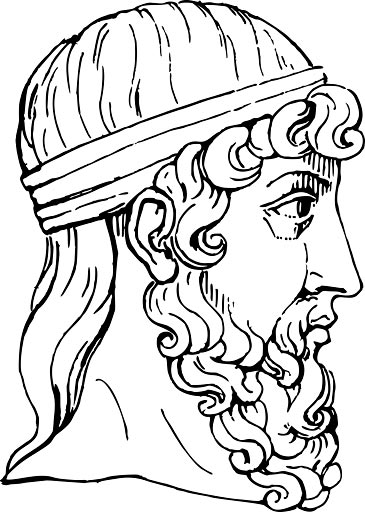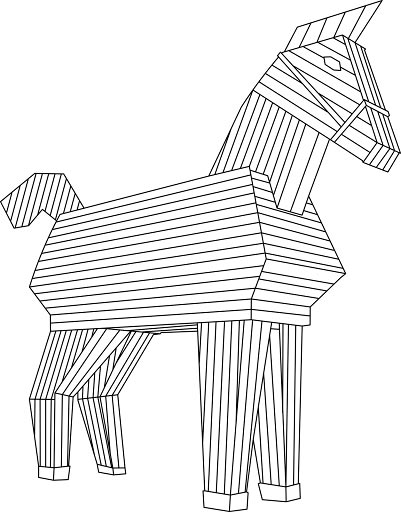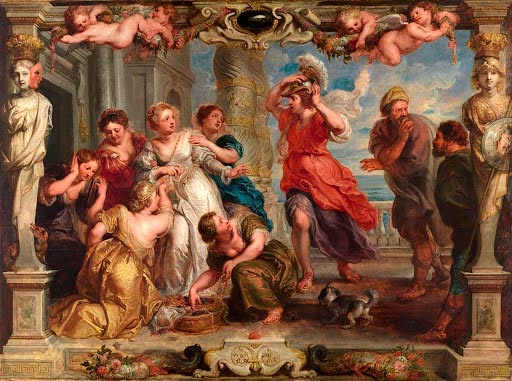Think
Achilles and the concept of masculinity
Nadia Aldunate Martín, 3rd year student of Degree in Hispanic Philology, invites us to reflect on the figure of Achilles and the concept of masculinity that he has represented throughout the centuries.

Unaware of fear, a lover of battle, violent and hungry for glory are some of the traits with which Homer describes Achilles. Thanks to him, the figure of the hero remained engraved in the imaginative eyes of the Greek people.
Later, Achilles crossed the boundaries of time and, caught in the words of works such as the Iliad, carried with him the concept not only of a hero, but also of a brave and strong man. After having ruled the minds of many others before our time, his story has come down to us. The Achilles described by Homer is not a thing of the past, for his remains are still perceived in inherited concepts.
Homer tells us in his Iliad about Achilles, without mentioning his past and the nine years of fighting in which he has participated, but showing us that the war has made him a person of overwhelming strength. Thus, he places the character directly in the tenth year of the Trojan War and decides to make his anger the protagonist.
Achilles, what sin can so enrage a man like you? The offence of the hero Agamemnon, who takes from him part of a booty that includes a woman, Briseis. In the end, Agamemnon has second thoughts and decides to return the woman to him, along with twenty of the most beautiful women in Troy and one of his daughters. Despite this opportunity, Achilles refuses to accept the offer, proving that what really matters is that his strength and power have been questioned.
This strength turns to fury when his friend Patroclus dies in battle at the hands of his enemy Hector. In the grip of this feeling, Achilles is able to make peace with Agamemnon in order to kill Hector. The hero wants to prove that no one should question him, and after killing Hector, he binds up his corpse and drags it mercilessly through Troy. Thus, Achilles' qualities of strength and courage end up making him impulsive, capable of defying gods and men and showing no respect for the dead, a concept of real importance at the time. The hero wishes to prove that he is a man endowed with courage, something with which the great characters of history are identified. But should pride, violence and ambition guide us in the construction of our prototype of man?
It is at this moment, at the end of the Iliad, that we get the unexpected sample . Priam, Hector's father, begs Achilles to return his son's body to him so that he can give him a dignified burial. The hero is reborn with a feeling he had ignored until now: pity. Guided by the voice of the gods, the hero returns the body of the deceased to his father and manages to overcome his instincts.
Homer ends up demonstrating that, despite everything he has done, this character with a violent attitude is capable of feeling compassion and rectifying his mistakes. Re-reading his story allows us to reflect on the initial idea and to sample us that it is not true that men, simply because they are men, should hide their feelings and avoid weakness. This last decision challenges an assumed concept of a sex marked by the repression of feelings, in which it is frowned upon to show outward weakness, suffering or pity. Achilles succeeds in teaching that these are not signs of weakness, but of humanity.
Having discovered this detail in the hero's character, questions arise about his true personality. Leaving behind the familiar, warlike, adult image presented to us by Homer, we focus on his childhood and youth.

It is said that he was "fed exclusively on the entrails of lions and wild boars" in order to achieve the strength characteristic of these animals; therefore, from a young age he was expected to develop the stamina and energy of a good man. However, there is one detail that surprises us: it is also said that he was fed on honey, which gave him sweetness. Something similar is true of his education, for he was instructed in hunting and horse training, but he also learned to sing and play the lyre. From an early age, Achilles developed the vigour with which great men are identified, but also the gentleness and sensitivity that we have over time associated with women.
After this balanced childhood, Achilles was called to leave for Troy. His mother Thetis warns him of the end that awaits him, for an oracle has told him that he will die at Troy. Achilles, the famous warrior, goes into hiding and stays away from the war for nine years at the court of the Scythian king, Lycomenes, and he will do so in an unusual way: disguised as a woman.
A painting by Rubens allows us to visualise this stage of Achilles' life: he appears among the women of the palace, surrounded by an overloaded decoration in which delicacy and coloured flowers stand out. Achilles was called "Pyrrha" (i.e. "the blonde") because of "her fiery blonde hair". In the painting, the young man stands in the centre dressed in brightly coloured, delicate clothes, like women's dresses. However, he is donning a war helmet, which is typical of men. This fusion breaks with established moulds and allows the feminine and masculine to blend. The painting also highlights a division. On the one hand, the men are shown next to a dog, which is in the position of attack; on the other, the women, delicate and frightened, are shown next to a fox, which could be a symbol of cunning (sometimes related to women). Achilles, however, appears in the middle of the two groups. He does not seem to choose either of the two worlds, as he merges hitherto divided concepts.

The strong warrior spirit that surrounds the figure of Achilles is undeniable, but in him we discover numerous traits in which man and woman are united, demonstrating that the combination of different qualities, usually divided by gender, are what make Achilles a true man. In this young man, the masculine is at once feminine; the sweetness of honey does not cloy with the taste of flesh, a garment covers a man's body, delicacy is combined with the sword and, as Homer makes clear, war also causes him pain and compassion.
With Achilles we discover another concept of man, result of small details in his upbringing and decisions throughout his life that dismantle the vision we ourselves have of how masculinity should be represented.
bibliography
P. Grimal. Dictionary of Greek and Roman mythology. Prologue by Pedro Pericay, Barcelona, Paidós, 1994.
C. García Gual. Diccionario de mitos. 2003.
C.Harrauer. Dictionary of Greek and Roman Mythology. Translation by J.A. Molina Gómez, Barcelona, 2008.
If you liked the article, you might be interested in one of our Degrees!









